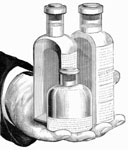
Selling Sinners on Salvation
NO PROBLEM. NO SALE.
When I was an altar boy in Boston during the Korean War, our parish offered three weekday morning Masses — 5:30, 6:15, and 7:00 — and attendance was quite high. Many attendees were praying for their sons at war, I’m sure. Perhaps half of these people, on average, received the Eucharist. Presumably those who didn’t had either consumed food since midnight (the old Eucharistic fast) or were not in the “state of grace.”
Over a 25-year period, from 1972 to 1997, I watched the percentage of Catholics receiving the Eucharist at Sunday Mass increase markedly. I use the term “watch,” because for all those years I was one of the few who remained in the pew. You see, I was a sinner unwilling to confess and relinquish certain types of sins. Knowing how Jesus railed against self-righteousness, I refused to receive the Eucharist sacrilegiously.
A half century ago, Pope Pius XII remarked that the paramount sin was that “we have lost our sense of sin.” It’s gotten worse since then. Does no one commit mortal sins anymore? Not likely.
Maybe all the mortal sinners stay home on Sunday morning? Or most of those who attend Mass are in a state of grace, which explains the high percentage of communicants, right? If you believe that, I’ve got some swampland you should buy!
You May Also Enjoy
Feminism in the Service of Exploitation... Fetch Your Pooper-Scooper!... Evangelicals Have "Made It" — Onto the Slippery Slope... Bacterial Roulette
To Anglicans, healthy Anglican Use parishes offer an appropriation of all that is best in the Catholic patrimony of Anglicanism.
As we try, in our troubles, to picture to ourselves who we are, we have recourse to the knowledge that God calls us to imitate Him and love as He loves.

